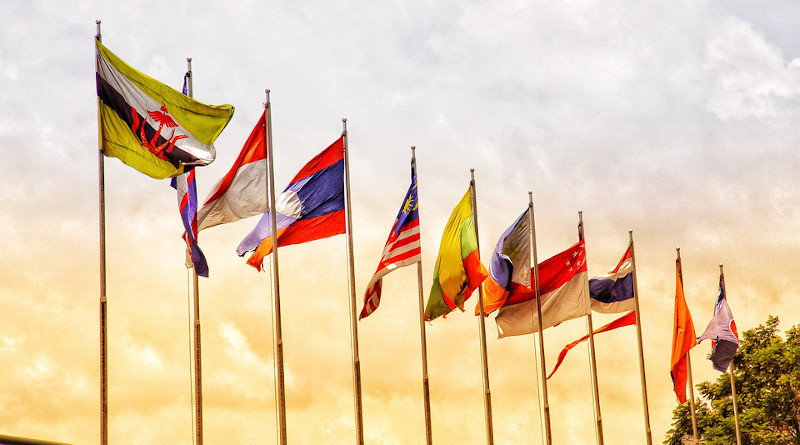The United Kingdom’s ‘Tilt’ Toward The Indo-Pacific – Analysis
By Jürgen Haacke*
The United Kingdom will soon become ASEAN’s 11th full dialogue partner after the grouping decided to accept the ASEAN Secretariat’s recommendation to confer dialogue-partner status in April 2021. The decision closely followed UK Foreign Secretary Dominic Raab’s visit to Southeast Asia in early April 2021 and tireless efforts by UK officials to outline the multifaceted rationale for reinforcing its engagement with Southeast Asia.
The United Kingdom established several new major posts to give substance to its post-Brexit referendum narrative of ‘Global Britain’ and its engagement with Southeast Asia. This includes the Singapore-based British Defence Staff and the Trade Commissioner for the Asia Pacific in 2018 as well as a resident UK Ambassador to ASEAN in November 2019. All of these posts have provided focal points for deeper cooperation and strategic communication.
ASEAN’s decision was not a foregone conclusion, as the bloc had in place a longstanding moratorium on new dialogue partners. In 2020, there was speculation that a positive decision on the United Kingdom’s application might be opposed from within the organisation. ASEAN has also been preoccupied with Myanmar’s military coup in February.
Yet the outcome was perhaps a matter of time given the strength of the UK case. Before exiting the European Union, the United Kingdom already entertained a dialogue partnership with ASEAN, albeit one mediated by its EU membership. Beyond its historical ties with the region, its residual military presence in Brunei, and its membership of the Five Power Defence Arrangements, the United Kingdom had also acceded to ASEAN’s Treaty of Amity and Cooperation in 2012 when then prime minister David Cameron announced that the country would end its ‘benign neglect’ of the region.
Between August 2020 and April 2021, an Economic Dialogue and two open-ended Troika virtual meetings between ASEAN foreign ministers and the UK foreign secretary were organised. The Troika meeting in April concentrated on COVID-19 and other areas of cooperation, including climate change adaptation, enhancing ASEAN–UK supply chains and deepening technological ties.
London has also worked on deepening individual economic and security ties with ASEAN member states. UK Foreign Secretary Raab visited Jakarta in April 2021 to attend the Third Partnership Forum, signing a memorandum of understanding on establishing a joint economic and trade committee with Indonesia to address market access barriers.
Once the United Kingdom is a full dialogue partner, its multilateral regional engagement is set to increase further as it stands to join forums such as the ASEAN Regional Forum and the ASEAN Defence Ministers Meeting Plus. Britain could also hope to become a member of the East Asia Summit.The United Kingdom may also eye a trade agreement with ASEAN, identified as a ‘high priority’ by UK officials. In the more immediate future, the United Kingdom’s focus is to win accession to the Comprehensive and Progressive Agreement for Trans-Pacific Partnership.
Given differences in diplomatic culture, how the United Kingdom and ASEAN states will address political developments within Southeast Asia could define the partnership in important ways. As London’s strong response to developments in Myanmar indicates, the United Kingdom did not hold back on its values agenda as ASEAN reviewed its application for dialogue partner status. With democracy in Southeast Asia regressing in recent years, it is not obvious how the United Kingdom’s emphasis on the need to reinforce and protect open societies and economies will be fully shared across the ASEAN region.
The current re-engagement with Southeast Asia is part and parcel of a wider rebalancing of UK foreign policy and security. As Dominic Raab argued, the UK government’s ‘vision for a truly Global Britain will tilt … to the Indo-Pacific region’. The government’s Integrated Review of Security, Defence, Development and Foreign Policy identified China as a ‘systemic competitor’. In this context, the United Kingdom is interested in maintaining major aspects of the existing order and ‘shaping the open international order of the future’.
Defence engagement is a major aspect of the United Kingdom’s ‘tilt’. The aircraft carrier HMS Queen Elizabeth is currently leading a carrier strike group to the Indo-Pacific, marking a new era of British maritime power. As expressed in the recent UK Defence Command Paper, Britain aims to achieve ‘a more proactive, forward deployed, persistent presence’ in the Indo-Pacific region. This will initially involve deploying two offshore patrol vessels to this region from 2021. A littoral response group is expected to operate in the Indo-Pacific from 2023.
UK diplomacy will need to balance its interest in deepening commitment with ASEAN while at the same time working more closely with security partners and allies in the Indo-Pacific that espouse a somewhat sceptical view of the grouping’s collective ability and willingness to stand up to China and defend key elements of the existing rules-based international order.
Attaining ASEAN dialogue partner status post-Brexit constituted one of the United Kingdom’s major diplomatic objectives in the context of its ‘Global Britain’ ambitions. ASEAN’s acceptance has boosted London’s relations with Southeast Asia significantly, making for an important pillar of the country’s ‘tilt’ toward the Indo-Pacific.
*About the authors: Jürgen Haacke is Associate Professor in International Relations and former Director of the Saw Swee Hock Southeast Asia Centre at the London School of Economics and Political Science.
Source: This article was published by East Asia Forum

